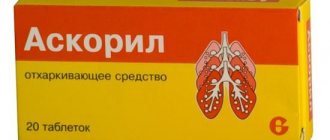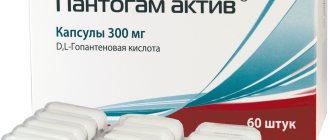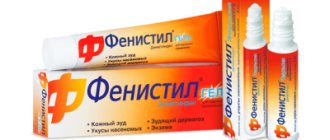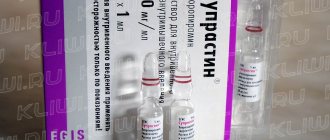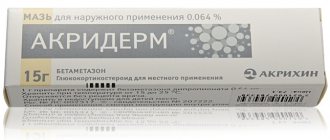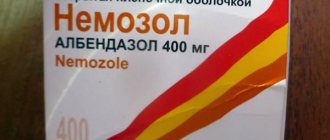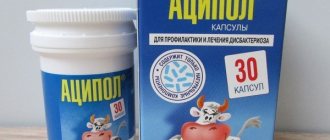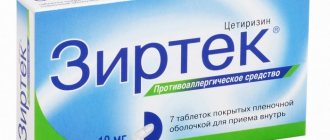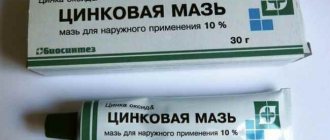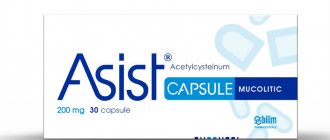Syrup for tracheitis
Tracheitis is an inflammatory process of the mucous membranes of the trachea, which occurs as a result of a viral or bacterial infection. The pathology itself does not pose a threat; its complications are much more dangerous: with improper therapy, adverse consequences can occur such as an intense cough that lasts for weeks. As a result, the proper functioning of the respiratory organs will be disrupted, various pathological processes will appear, and asphyxia is likely in childhood. Therefore, it is impossible to delay treatment of tracheitis. The most popular remedy for eliminating unpleasant symptoms is syrup for tracheitis. The main advantage of such a medicine will be its gentle effect on the affected areas in the trachea.
Syrup for tracheitis - the effect of use
A similar pathological process is observed in many people. Tracheitis is observed in both childhood and adulthood. However, the disease is most difficult for children of preschool age to bear. Various medications are used to treat tracheitis. In the process of treating the disease, doctors prescribe cough tablets and inhalations, but the most common is the use of syrups that will promote the removal of sputum. Before choosing such a remedy, you need to determine the nature of the cough using the following algorithm:
- An assessment is made of the manifestations of cough, its nature: intensity, frequency and duration.
- The provoking factor and structure of sputum are established: density, presence of purulent contents, shade, frequency of discharge. The presence or absence of spasms in the bronchi is revealed.
- An assessment is made of the compliance of the syrup used with the symptoms, its pharmacological properties, indications and contraindications.
The syrup is used in the following sequence: in the daytime, one is prescribed that helps remove phlegm and will increase the productivity of the cough, and before bedtime, those that block coughing and alleviate attacks are prescribed.
The most common means include:
These remedies help eliminate cough and affect inflammatory processes. An extremely popular cough syrup for tracheitis for children is Sinekod. It is acceptable for use even during diabetes, since it does not contain sugar. Syrups containing codeine are often used for tracheitis. For example, Codelac. It contains thermopsis and licorice root. A specialist can recommend the use of combined agents (Ascoril). It has expectorant, mucolytic and bronchodilator effects.
How to take Gerbion
Instructions for use Gerbion suggests familiarizing yourself with the permissible doses of the drug, which will help eliminate the symptoms of a dry, painful cough. Primrose or plantain syrup can be used in pediatrics for children from 2 years of age, as well as in combination with other drugs, including antibiotics, antihistamines, cold medications and others. One measuring spoon of syrup is equal to 5 ml of the drug. You can take the drug in the following doses:
- Adults and children over 14 years of age take 10 ml.
- Children from 7 to 14 years old – 5 – 10 ml.
- From 2 years old take 5 ml.
The therapeutic course is 7 – 20 days. You need to take the medicine 3 to 4 times a day. While taking the medicine, you need to drink it with water. If there is a need, a dry cough from taking the drug has turned into a wet one, treatment can be continued with Gerbion syrup with primrose, which is intended for the treatment of wet cough. The general course of treatment with drugs from the Gerbion series can take up to 3 weeks.
What syrups are used for tracheitis
Continuous coughing attacks quickly exhaust the patient. Appetite is lost and irritability appears. In order to counteract cough, the treating specialist prescribes the following syrups:
- Sinekod. Available in the form of tablets and solution. The inhibitory effect is aimed at the cough center. Gives a moderate anti-inflammatory, bronchodilator and antitussive effect. Prohibited for use by infants in any form. From 2 years old it is possible to use it as drops, from 3 years old - syrup, and from 12 years old - tablets.
- Gerbion. The plant base of the drug has an antitussive, antiseptic, and anti-inflammatory effect. Prohibited for use if you have hypersensitivity to fructose or diabetes.
- Codelac. Has a pronounced antitussive effect. Includes codeine, thermopsis, thyme and licorice. Do not prescribe during asthma, allergic reaction to herbs and acute respiratory failure.
- Stoptusin. Available as a solution and tablets. It has antitussive, bronchodilator, analgesic and mucolytic effects. Not for use by children under 12 months;
- Bronchicum. Helps reduce paroxysmal cough. Prohibited for tracheitis in children under 6 months, with impaired kidney and liver function.
- Bronholitin. It has an antitussive, bronchodilator and antibacterial effect. Basil oil acts as a sedative and antispasmodic. Ephedrine helps improve breathing and relieves swelling. Prohibited for treatment by children under 3 years of age.
- Libexin is used to dilate the bronchi and eliminate the inflammatory process. Prescribed only by a specialist, not used if there is significant sputum production.
- Linkas. It is acceptable to use for wet cough. The product has a herbal base, reduces cough, the thickness of sputum, reduces its excretion and eliminates the inflammatory process.
Lozenges
Absorbable tablets in the form of lollipops and lozenges are often used for tracheitis. Such drugs can have antiseptic, mucolytic and emollient effects. They allow you to quickly relieve attacks of dry cough and eliminate the feeling of irritation in the throat. They are prescribed to both adults and children. The most common lozenges for tracheitis include the following medications:
- "Faryngosept".
- "Strepsils".
- "Decatylene".
- "Neo-Angin".
- "Trachisan."
- "Lizobakt".
- "Lazolvan."
- "Travisil."
- "Dr. MOM."
Not all of the listed drugs can be used in pediatric practice. This should be taken into account when choosing tablets for the treatment of tracheitis in young patients.
List of effective cough medicines for tracheitis
For therapeutic purposes, for tracheitis, medications are prescribed that suppress the cough reflex, dilute and remove mucus. Cough medications are selected on an individual basis; there is no single drug for the symptoms of the disease. The most popular means:
It is forbidden to use medications without the consent of a doctor. Each drug has a number of contraindications.
Ascoril
Ascoril is used for therapeutic purposes for dry cough. It helps increase the volume of sputum and increases its viscosity. Before using the drug, you need to find out about its contraindications and dosage. Due to the large number of contraindications, it is recommended to use the drug only with a prescription from a specialist. These include:
- heart and vascular diseases;
- diabetes;
- acute diseases of the digestive tract;
- pregnancy;
- age up to 6 years.
The doctor selects the dosage individually for each patient. In certain situations it will differ from the one indicated in the instructions. It is necessary to emphasize that Ascoril is intended to eliminate the symptoms of pathologies of the bronchopulmonary system. But the drug is considered auxiliary; it is not used as a full-fledged treatment for tracheitis.
Ascoril is used along with other medications. Treatment is prescribed by a doctor after conducting a comprehensive examination of the lungs and establishing the type of cough. The syrup is approved for use by children.
Erespal syrup
If the disease is not severe, it is possible to use milder syrups. One of them is Erespal. The drug has virtually no contraindications; it is used according to the following scheme, taking into account the age of the patient:
- Children from 2 to 4 years old take syrup based on unit weight: per 1 kg there is no more than 4 mg of syrup per day.
- from 4 years and older with a body weight of up to 10 kg per day, 3 tsp are given. funds throughout the day at regular intervals. For children 10 kg or more, the dose is measured in tablespoons, the frequency of doses remains the same.
- Patients aged 14 years or more use the product in the amount of 3-6 tbsp. l. per day, taking into account the severity of cough.
The medicine is taken before meals, and before using it, the bottle of syrup must be shaken thoroughly. The drug helps transform a dry cough into a productive one. The product is prohibited for use during pregnancy and in the presence of diabetes.
Sinekod syrup
To suppress the cough reflex, Sinekod is often used, which has the following effects:
- eliminates cough;
- removes phlegm;
- dilates the bronchi;
- relieves inflammation.
Sinekod acts directly on the cough center, the patient’s condition becomes better after using it: breathing becomes easier, and the blood receives more oxygen. Sinekod can be used even in childhood under strict medical supervision:
- children who have symptoms of tracheitis use the medicine as a syrup or in drops;
- adults can also use the tablet form.
Sinekod does not contain sugar, but only its substitute - sorbitol, therefore it is approved for use by people who suffer from diabetes. The product is prohibited for use by pregnant women and during lactation. Since Sinekod often provokes drowsiness, those who are driving a vehicle and when performing other tasks that require concentration need to be extremely careful.
Side effects appear quite rarely, but in some cases they may include:
- allergic reaction;
- dizzy;
- nausea;
- diarrhea;
- exanthema.
Despite the fact that Sinecode is available for purchase and does not require a doctor's prescription, it should be used only with the consent of a specialist.
overslept
The product is made from ivy extract, has a mucolytic effect and helps thin mucus. In addition, it is involved in activating the work of the ciliated epithelium, which promotes mucus, suppresses the formation of infection, and eliminates spasms in the bronchi and lungs.
Prospan can be used to treat patients at any age. For these purposes, several forms of the drug have been developed with different dosages of the active substance. It is produced in 2 types of syrup - for children and adults, as well as drops for internal use and inhalation. However, there are certain contraindications to the use of the product:
- Any form of Prospan is prohibited for use during pregnancy. During lactation, the medicine is taken after consultation with the doctor.
- Drops are not prescribed to children under 2 years of age, people who are predisposed to spasms, or those with bronchial asthma.
- The syrup should not be used if there is an increased sensitivity to fructose, congenital glucose-galactose malabsorption, or difficulties with alcohol.
- Prospan can be combined with antibacterial agents.
Lazolvan
The syrup is advisable to use for: uncomplicated inflammatory pathological processes of the respiratory tract in an acute form, which are associated with an incessant cough - laryngitis, tracheitis, bronchitis, etc. The product is not used for:
- pregnancy and breastfeeding;
- high susceptibility to Lazolvan components;
- in case of chronic renal or liver failure.
Lazolvan cannot be combined with other cough medicines. In addition, it is prohibited in the 1st trimester of pregnancy, when a woman is breastfeeding a baby, as well as in a situation where a gastric or duodenal ulcer is detected.
For therapeutic purposes of tracheitis, Lazolvan is used only as prescribed by a specialist. The effect of the drug in such a pathological process has been proven by medical practice. It helps to reduce the length of sick leave by approximately 1.5-2 times. For other diseases of the respiratory tract of a chronic nature, treatment can be carried out faster and more effectively with the help of Lazolvan.
Fluditek
Fluditec syrup is produced as a 5% solution of carbocisteine. It is a light green translucent liquid with a sweet, pleasant aroma in glass packaging. The syrup is prescribed for adults, as well as teenagers from 15 years of age. The daily dosage of the product is 45 ml (15 ml, 1 tbsp, three times a day).
The product can be consumed by stirring it with water, or in its pure form, but washed down with the required volume of liquid. Fluditec is best used after meals. Indications for use will be acute respiratory diseases with accompanying intense dry cough and difficult sputum discharge (bronchitis, runny nose, tracheitis, bronchotracheitis, pneumonia, otitis). It is not recommended to use syrup for wet cough. There may be difficulties with the discharge of excessively liquefied sputum.
Some patients observe an irritating effect of Fluditec on the laryngeal mucosa, which is associated with soreness and worsening cough. This is probably a manifestation of an allergic reaction. Each person’s body is individual, therefore it is necessary to choose any medication carefully, weighing all possible risks.
Contraindications
We will look at how to take it correctly in this material.
diabetes;
congenital fructose intolerance;
glucose-galactose malabsorption syndrome;
congenital deficiency of sucrase-isomaltase;
children under 2 years of age.
children after acute obstructive laryngitis (croup);
bronchial asthma;
diabetes;
hereditary fructose intolerance;
glucose-galactose malabsorption syndrome and congenital sucrase-isomaltase deficiency;
Syrup or tablets - which is better for tracheitis
Effective drug therapy for tracheitis involves the use of syrups, since this form of drugs directly can reach all areas of the trachea and bronchi. In addition, inhalations through ultrasound devices and antiseptic drugs are used.
Pain relief tablets contain flavorings and dyes, so an allergic reaction may occur to the components of the medications. In addition, children under 3 years of age are prohibited from using tablets, and lozenges are allowed to be used no earlier than 5 years of age. In this regard, when asked what is best to use for tracheitis, the choice will be made in favor of syrups. They are acceptable for use regardless of age and have a milder effect on the respiratory tract.
special instructions
When prescribing the drug Gerbion with primrose root extract, persons suffering from diabetes mellitus should be careful.
The medicine does not affect the ability to drive vehicles and machines.
It has been established that 5 ml of medicinal syrup contains 4 g of sucrose. Therefore, when treated with this drug, patients receive 0.4 bread units; 10 ml contains about 8 g of sucrose and, accordingly, 0.8 bread units.
Tips for choosing and taking syrups
To choose the most effective cough syrup for tracheitis, you need to familiarize yourself with the instructions of your treating specialist. This issue must be resolved individually, taking into account age indicators, general condition, and severity of the pathology. It would be logical that at the peak of the pathological process, with an intense dry cough, it is advisable to use a medicine designed to suppress the cough. If there is a wet but unproductive cough, at the stage of resolution of the disease, therapy with mucolytic syrups that dilute and remove sputum is recommended.
The choice of syrup in the presence of tracheitis from plant or chemical components is the task of a specialist. Any medication is characterized by side effects and a number of contraindications, and syrup from plantain extract, which seems harmless at first glance, can cause a serious allergic reaction. Before choosing a method and means for treating a patient with tracheitis, you should definitely find out the recommendations of a specialist. Self-treatment can cause irreversible consequences.
source
Which Herbion helps with dry cough
There are two types of cough - wet and dry. The first is a productive reflex, accompanied by the discharge of mucous secretion from the bronchi
For a cough to turn from dry to wet, some time must pass, during which it is important to help the body and speed up the liquefaction of sputum. The line of products produced by the KRKA company from Slovenia includes several herbal preparations for different types of cough
This must be taken into account when choosing the right drug.
For those interested in which Herbion to choose for dry cough, it is better to take a closer look at the plantain-based syrup. Everyone knows about the healing power of this plant. Both in folk and traditional medicine it is used as a wound-healing, anti-inflammatory, expectorant, bactericidal, and antiallergic agent. Therefore, it is not surprising that it was included in the mucolytic syrup. The drug counteracts bronchopulmonary infections, inhibits the proliferation of bacteria and improves secretion.
What is Gerbion like?
There are several types of this medicine. Gerbion syrup has the following varieties:
- Herbion ivy syrup.
This drug contains ivy leaf extract, which has an expectorant, antispasmodic and mucolytic effect. Removes phlegm and improves breathing. - Cough syrup Gerbion with plantain.
This is the same drug that is discussed in this article. - Herbion primrose syrup.
Another mucolytic of plant origin, which includes primrose roots, thyme and other expectorant components.
Gerbion syrup for dry cough - composition
The main active ingredient of the drug is plantain leaf extract, but Gerbion syrup has a more extensive composition. It includes:
- mallow flower extract;
- ascorbic acid;
- sucrose;
- orange oil flavoring;
- methyl parahydroxybenzoate.
All of them are aimed at complex therapy of upper respiratory tract infections, the main symptom of which is a dry, unproductive cough. The syrup smells pleasant and tastes sweet, so children drink it with pleasure without refusing treatment, as is often the case.
Syrup for tracheitis - the effect of use
This disease is equally diagnosed in both children and adults. It often acts as a complication of a cold or flu.
Regardless of the cause of the inflammatory process, treatment consists of using drugs that eliminate the source of infection and remove unpleasant symptoms.
Often, cough syrups and tablets are included in drug therapy. This sign is a hallmark of tracheitis. Intensification of attacks occurs at night and after waking up. Therefore, the main task of such funds should be aimed at transitioning from a dry cough to a productive one, thinning viscous sputum and facilitating its discharge, and stopping cough reflexes at night. Expectorants, mucolytics, antitussives and combination drugs cope with this.
In the first days of the illness, you should use those remedies whose effects are aimed at overcoming a dry cough.
After 3-4 days, sputum begins to form. But it is so thick that it cannot leave the respiratory tract. Then expectorants and mucolytics come to the rescue:
When choosing cough syrup for tracheitis for children, the emphasis is on the safety of the medicine. Antitussive drugs are rarely given to young patients, as they act directly on the cough center and are addictive. Therefore, doctors prescribe medications for tracheitis that have a combined effect.
This category includes:
They contain herbs that do not have side effects and help to quickly cope with any type of cough.
Side effects
When taking syrup, allergic reactions may develop. Therefore, if any undesirable effects occur, it is recommended to stop taking the drug and consult a competent specialist for advice.
Using the drug without a doctor's prescription, in excessive dosages, can lead to unpleasant consequences. The herbal components in Herbion for the treatment of wet cough cause side effects. It is possible that reactions may develop, accompanied by:
- skin rashes;
- redness of the epidermis;
- hives;
- peeling;
- allergic rash;
- skin itching;
- burning.
If unpleasant phenomena occur, you should consult a doctor to change the dosage or completely discontinue the medication. Side effects are provoked by taking a large amount of the drug containing herbal components. Complications cannot be ruled out:
- disorders of the digestive system - nausea, vomiting, diarrhea;
- puffiness, swelling of the mucous membranes;
- headache.
If there are contraindications for use or side effects occur, the doctor can select antitussive medications that have a similar therapeutic effect. There are effective medicines that are inexpensive and of plant origin. The most popular treatments for children starting from the age of one year are:
- Cook's syrup - contains licorice root, long pepper fruits, basil leaves, mint;
- Prospan - contains ivy extract and is available in liquid form for oral administration and solution for inhalation.
Effective antitussives based on herbal components for the treatment of children and adults:
- Dr. Theiss - syrup with plantain extract, contraindicated only in case of sensitivity to the components, used for babies starting from one year.
- Linkas – granules for preparing a solution for internal use, syrup. Contains licorice root, fennel fruits, violet flowers, eucalyptus leaves, prescribed for children from 3 months.
- Doctor MOM - has more than a dozen plant components - roots, leaves, fruits, flowers. Recommended for children from three years old.
To treat wet cough, doctors prescribe medications of synthetic origin. Popular products based on chemical compounds:
- Ambrobene - the active ingredient ambroxol, relieves inflammation, improves immunity, improves mucus separation, prescribed from two years of age;
- Bromhexine - active ingredient - bromhexine, relieves the condition on the fourth day, syrup is allowed from two years of age;
- Ambroxol is a mucolytic agent that improves the removal of sputum; the active ingredient is ambroxol hydrochloride, effective from 2 years of age, but has contraindications.
Taking into account the prevailing symptoms of the disease, at the stages of treatment, the doctor may prescribe medications with various properties. Expectorant drugs include:
- medicines of synthetic origin - Pertussin, Lazolvan, Thermopsis, Glyciram;
- medicines containing herbal components - licorice root syrup, marshmallow, Mucaltin, Bronchofit, Stoptussin-phyto.
During treatment, medications can be used to help alleviate the patient’s condition with diseases of the upper respiratory tract, accompanied by coughing attacks:
- relieving bronchospasms, increasing the lumen of the bronchi - Salbutamol, Papaverine, Bronchocin;
- means for thinning viscous sputum - ACC, Carbocysteine, Fluimucil, Codelac Broncho.
What syrups are used for tracheitis
To treat cough, medications are used with:
- antitussive effect. It is better to take them in the first days of illness to stop an attack. The drugs act directly on receptors located in the brain or respiratory tract. Rarely prescribed to children under 3 years of age;
- mucolytic effect. Prescribed to patients 3-4 days after sputum begins to form. They help dilute the secret so that it is easier for him to come out. It is also allowed for children under three years of age, but only a doctor prescribes the dosage;
- expectorant property. Prescribed for tracheitis when the cough has become productive. Helps activate the cough reflex and remove large amounts of secretions;
- combined effect. Such drugs are used for tracheitis in children from birth. They include medicinal herbs. They have a pronounced anti-inflammatory property. With a dry cough, the reflex is dulled and the formation of a protective film is promoted.
Only a doctor can say which medicine is best to use, based on the clinical picture of the disease and the age of the patient. You should not self-medicate, as many medications have contraindications and side effects.
What syrups are used for tracheitis.
Indications
Inflammatory respiratory diseases and difficulty breathing are accompanied by a cough with difficult-to-separate sputum. In such cases, medications with an expectorant effect, for example, Gerbion primrose syrup, help well. It is prescribed with the combined use of other drugs and therapy methods for:
- inflammatory diseases of the mucous membranes of the bronchi, trachea, bronchioles;
- acute diseases affecting the nasal passages and respiratory passages.
The second case is characterized by a dry cough, the first by a wet cough. Syrup is a highly effective antitussive medicine, suitable for the treatment of both the first and second types of diseases.
It is completely safe because it is created using herbs, without adding chemicals. For production, only purified natural plants are used - primrose and plantain. The main elements included in the preparation are primrose root extract and thyme herb. The root contains vitamins C and glycosides of a group of organic compounds. It is produced in the form of syrup, the volume of the bottle is 150 milliliters, and a measuring spoon is included. Saponins present in the composition enhance bronchopulmonary secretion. It is this fact that contributes to the antitussive effect. At the same time, they facilitate the removal of sputum due to the fact that they dilute and increase its volume. In addition, a protective film is formed on the mucous organs and respiratory tract, due to this, irritating effects are reduced, the throat is not injured, and the reflex that appears when coughing is eliminated.
List of effective cough medicines for tracheitis
As soon as the patient develops a cough, the medicine must be chosen as soon as possible. The type of drug and dosage should only be prescribed by a doctor. In practice, there is a whole list of effective means.
Ascoril
- Bromhexidine. It is mucolytic. Shows expectorant and antitussive effect. The effect of the substance is to increase the amount of sputum, decrease the density and accelerate the process of its elimination;
- salbutamol. Refers to bronchodilators. Prevents spasm of the larynx, trachea and bronchi. After consumption, it dilates the coronary artery, but does not affect blood pressure;
- guaifenesin. Refers to mucolytics. Promotes the transition of a dry cough to a wet one.
Thanks to this composition, Ascoril has bronchodilator, mucolytic and expectorant properties.
The instructions state that it is prohibited for children under 6 years of age. But in pediatrics it is often used to treat children 3-5 years old.
Erespal syrup
A combined agent that has antiallergic, anti-inflammatory, antispasmodic effects. Doctors recommend it not only for adults, but also for children over 2 years old.
The medicine contains several components in the form of:
- fenspiride hydrochloride;
- licorice extract;
- sucrose;
- vanilla tincture;
- glycerol;
- potassium sorbate;
- glycerin;
- flavorings;
- purified water.
The effect of the medication is aimed at suppressing the inflammatory process, relieving swelling and hyperemia, eliminating allergic manifestations, and reducing muscle tone in the respiratory tract.
Sinekod syrup
Belongs to the group of antitussives. Eliminates a cough attack at the reflex level.
The drug contains:
- butamirate citrate;
- sorbitol solution;
- glycerol;
- vanillin;
- purified water.
Prescribed for tracheitis in the first days of illness. Relieves cough by acting directly on reflexes in the brain. May become addictive with prolonged use.
According to the instructions, it is prohibited for children under 3 years of age. But since many drugs from this group are contraindicated for children, they are sometimes used in pediatrics at a younger age. But the whole process must take place under the supervision of a doctor.
overslept
One of the best remedies for children of different ages. This is a combination drug of plant origin.
Prospan contains safe components in the form of:
- ivy leaf extract;
- fennel oil;
- sodium saccharin;
- anise oil;
- ethanol;
- peppermint oil.
Thanks to this composition, the medicine exhibits several beneficial properties:
- expectorant. Liquefies thick mucus and removes it from the bronchi and trachea. Acts directly on the ciliated epithelium;
- antitussive. Reduces the intensity of a cough attack;
- antispasmodic. Eliminates spasm of muscle structures in the respiratory tract. Due to this, sputum is removed better;
- antimicrobial. Eliminates the inflammatory process. Has an adverse effect on pathogenic flora.
There are only a few contraindications in the form of increased susceptibility to the components of the medication and the presence of alcohol dependence.
Lazolvan
Often used to treat children, as it is considered safe. Belongs to the group of mucolytic and expectorant drugs. The active ingredient is ambroxol hydrochloride.
For tracheitis, it can be taken orally or used as inhalation. Indicated for wet cough, which is accompanied by viscous sputum.
The instructions indicate that children under 2 years of age are a contraindication. But doctors prescribe it in a reduced dosage. It is forbidden to combine with medications that suppress the cough reflex.
Fluditek
A medicine with a mucolytic effect. Improves sputum discharge and reduces the severity of a cough attack. The positive effect is due to the presence of carbocysteine in the composition. The active substance activates the enzyme of mucous membrane cells in the respiratory tract, thereby producing liquid mucus.
The medicine also helps restore damaged tissue, increases the functionality of epithelial cilia, and improves immunity at the local level.
Prescribed for adults and children over 2 years of age.
- stomach and intestinal ulcers
- increased susceptibility to the components of the drug;
- chronic glomerulonephritis.
Cope with cough in a few days, but treatment continues for at least 8 days.
Release form and composition
The syrup contains active ingredients: extract of plantain leaves and mallow flowers, ascorbic acid.
Additional components: sucrose, methyl parahydrosibenzoate and orange oil.
Cough medicines under the Gerbion brand are represented by two main types of drugs:
- Primrose syrup;
- Plantain syrup.
The active ingredients of the first product are aqueous extracts of spring primrose roots and common thyme herb, menthol.
Excipients in Gerbion syrup with primrose: sucrose, methyl parahydroxybenzoate - E218, purified water.
In the second cough medicine, the active ingredients are liquid extracts of plantain leaves and mallow flowers, ascorbic acid.
Additionally, the plantain syrup contains sucrose, methyl parahydroxybenzoate - E218 and orange oil.
| Quantity, g | |||
| Active components | spring primrose (Primula veris L., f. Primulaceae) | Root extract liquid (1:2) | 1,03 |
| Common thyme | Herbal extract aqueous (1:3.3) | 2,06 | |
| Levomenthol | 0,62 | ||
| Excipients | Methyl parahydroxybenzoate (E 218) | ||
| Sucrose |
To prepare a liquid extract, use purified water (extractant). You should keep in mind the peculiarities of preparing the composition. As a result of the evaporation process, an aqueous extract is obtained:
- spring primrose roots (1:2) - corresponds to the formation of two parts of dry raw materials - extracts;
- common thyme herb (1:3.3) – implies obtaining 3.3 liquid extract from a single share of the plant.
The expectorant Gerbion comes in several types. The first type includes three active components: liquid extracts of plantain and mallow flowers, ascorbic acid. The excipients are sucrose, preservative and orange oil. The drug is sold as a brown suspension in a 150 ml bottle.
The second product is similar in release form; it contains liquid extracts of primrose and thyme, as well as levomenthol and a preservative.
In the third syrup, the main component is considered to be a single substance - dry ivy extract. It is combined with sorbitol, glycerol, citric acid and flavorings.
Syrup or tablets - which is better for tracheitis
Many patients do not know which is better: tablets or syrup. But for tracheitis, the liquid form of the medicine is most often prescribed. This is explained by the fact that the syrup enters all parts of the trachea and bronchi and creates a protective film.
If we talk about tablets, they act only on the upper parts of the respiratory tract and only in small quantities move lower. Thus, the effect is insufficient.
The choice of syrups also decreases when it comes to treating children under 6 years of age. It is easier to give them a tasty suspension than a tablet that takes a long time to dissolve.
If the child refuses to use the product, the syrup can be diluted with saline and used by inhalation. Thus, particles of the drug settle on the tissues and retain their therapeutic effect for a long time.
conclusions
What to do if you are diagnosed with tracheitis? What pills will help overcome this disease? Doctors warn that to treat such a disease you should definitely seek professional medical help. Self-medication can only lead to a worsening of the condition.
The pharmaceutical industry offers a huge variety of medicines that will help cope with this disease. These can be syrups, solutions, lozenges and tablets. The dosage and regimen of use of any drug should be determined only by a specialist. Most often, an integrated approach to treatment is used to quickly get rid of dry cough and other symptoms of tracheitis.
Tips for choosing and taking syrups
As soon as the patient develops a cough, immediate treatment is necessary. But it is prohibited to select syrup yourself, otherwise it may lead to adverse consequences. Only a doctor selects the drug, following some principles:
- To begin with, the doctor assesses the intensity, frequency and nature of the cough.
- The cause of the pathological process is established. If there is sputum, it is collected for examination. The result depends on the shade, thickness and presence of purulent contents.
- As soon as the shape of the cough is determined, syrup is selected. The patient’s age, clinical picture and the presence of contraindications must be taken into account.
Many drugs have side effects such as allergic reactions, nausea, abdominal pain, diarrhea or constipation. If such symptoms appear, the medicine should be discontinued immediately.
Syrup is taken 2 to 3 times a day. The dosage is calculated based on the patient's age. If the medication is prescribed to infants, the calculation is made based on the baby’s weight.
Syrup for tracheitis is one of the components of therapeutic therapy. In order for the medicine to be more effective, treatment of the pathology must begin as soon as possible. At the first signs, you should seek help from a doctor.
Syrup for tracheitis - which one to choose? The answer to this question is in the video.
source
How to use correctly
In order for the treatment to be effective, it is recommended to read the instructions for using Gerbion for wet cough. It should be remembered that the drug is ineffective if there is no sputum. However, taking the medicine helps improve the removal of even very viscous mucus from the respiratory tract.
Recommendations for the use of Gerbion differ depending on the type of drug. Let's look at them in more detail.
Herbion with ivy
Adult patients with a wet or poorly productive cough are recommended to take this remedy one spoon twice a day after meals. In order for the active substance to be better absorbed, the syrup should be taken with 200 ml of water.
The duration of treatment is 7 days. If, after two to three days after starting to take the medicine, there is no improvement in the condition, you should consult a doctor.
Herbion with primrose
This medicine is taken three teaspoons three to four times a day. It is also recommended to drink the syrup with a sufficient amount of boiled water. The total duration of taking the medicine in this case can reach two to three weeks. You cannot exceed this period on your own, since prolonged use of the syrup will lead to the development of undesirable reactions. If indicated, the doctor may extend treatment.
Tracheitis and its symptoms
Tracheitis develops due to damage to the tracheal mucosa by bacteria or viruses . Most often these are streptococci, staphylococci or pneumococci.
A disease of viral etiology can appear as a result of scarlet fever, influenza, measles, or chickenpox.
But in general, the disease can develop due to the presence of any pathogenic or opportunistic microorganisms in the respiratory tract.
The disease manifests itself in the form of the following symptoms :
- night and morning dry cough (its attacks are possible with deep breaths);
- pain behind the sternum and in the throat;
- hoarseness of voice;
- slight increase in body temperature;
- on the third or fourth day - separation of viscous sputum , which subsequently acquires a mucous consistency;
- general weakness.
Also, a patient with a complicated course of the disease may experience very noticeable noises when inhaling and exhaling, compression of the ribs during breathing and other manifestations of respiratory failure.
Cough with tracheitis and selection of medications for various types of cough
After three to four days, the cough, which is initially dry , becomes productive (with sputum production).
To eliminate this symptom, antitussive and expectorant drugs are used.
The first group includes
codelac, broncholitin, libexin, sinecode .
Lazolvan, bromhexine, ascoril, and ACC are used as expectorants when a cough becomes productive .
How to treat tracheitis?
Tablets and other forms of medication are prescribed only after examining the patient. A specialist can make a final diagnosis based on complaints, symptoms and examination of the patient. If a bacterial origin of the disease is suspected, a sputum test is required to determine the sensitivity of the pathogen to medications.
All therapy for tracheitis is aimed at eliminating the causes of the pathology, improving the patient’s well-being and increasing the body’s defenses. Therefore, to get rid of the disease, complex therapy is usually prescribed. First of all, a cough medicine is selected. Tracheitis is always accompanied by a dry paroxysmal cough. To relieve attacks, doctors recommend using antitussive drugs. Such products include “Gerbion” with plantain, “Sinekod”, “Ascoril”, “Tussin”, “Erespal”. Mucolytics in the form of "Ambrobene", "Lazolvan", "Gedelix", "ACC" will help remove phlegm.
Antibacterial therapy is prescribed strictly by a specialist if there are certain indications. The help of such drugs may be needed in cases where the patient's condition worsens and inflammation develops.
Methods for treating cough with tracheitis
In the first days of the development of a dry cough, it is necessary to cause sputum separation , which makes it difficult for the patient to breathe and represents a favorable environment for the proliferation of pathogenic microorganisms.
The first is used during the first week of treatment in accordance with the instructions.
For different ages of patients and with different degrees of severity of the disease, you can take the drug in different dosage forms: capsules, syrup or tablets.
Patients with individual intolerance to synthetic drugs used in the manufacture of ambroxol are recommended to take gedelix .
It is made from ivy extract and other plant components. The product is available in the form of drops and syrup.
To relieve a dry cough, you can use antitussives , but when using them, you must avoid expectorants.
One of the popular antitussive drugs that inhibits cough centers is sinekod , which is available for children and adults in the forms of syrup and tablets, respectively.
It not only eliminates cough, but also has an antimicrobial effect, and also has an anesthetic effect and eliminates foci of inflammation.
Syrups
With mild to moderate severity of tracheitis, you can do without potent medications.
You can try to limit yourself to milder syrups , which for the most part can be taken by adult patients and children.
One of these syrups is erespal. The drug has almost no contraindications and can be taken according to the following regimens, depending on the patient’s age:
- For children from two to four years old, the dosage of syrup should be calculated based on body weight: for each kilogram there should be no more than 4 milligrams of the drug per day.
- At the age of four years and older, with a child’s body weight up to 10 kilograms per day, give 3 teaspoons of syrup per day at regular intervals. For children 10 kilograms and above, doses of the drug are measured not in teaspoons, but in tablespoons, and the number of doses also remains threefold.
- Patients aged 14 years and older should take syrup in an amount of 3 to 6 tablespoons per day, depending on the severity of the cough.
The drug is taken before meals, and the bottle of syrup must be shaken well before using it.
The drug is contraindicated during pregnancy and diabetes; children can start taking syrup starting from six months of age according to the following regimens three times a day:
- 3-6 years – 5 milliliters;
- 6-12 years – 10 milliliters;
- 12 years and older - 15 milliliters.
Starting from the age of eighteen, the syrup can be taken 15 milliliters four times a day.
Folk remedies
A good additional way to treat cough with tracheitis are traditional methods.
But before using them, you should
coordinate the treatment with your doctor, since some components included in these recipes may worsen the patient’s condition.
Effective cough remedies that also have a beneficial effect on the patient’s overall well-being are:
- Milk with cocoa . Add 10 grams of cocoa butter to a glass of warm milk and heat the product in a water bath. The optimal amount is three to six glasses per day.
- Radish juice and honey . In a medium-sized radish, the middle is removed so that a depression is created into which a tablespoon of honey will fit. After some time, the radish will begin to secrete juice, which will mix with honey. You can take this mixture 10-12 hours after adding honey. The dose is taken three times a day, and the resulting amount must be divided into three equal parts and a new medicine must be prepared every day.
- Yarrow and licorice root are mixed in equal proportions, and you should get 40 grams of the mixture. This amount is poured into two glasses of boiling water and left to steep for three hours. After this, the infusion is filtered and taken three times a day, two glasses.
Herbion with plantain
When treating dry cough, it is best to give children Gerbion syrup with plantain because:
- it is created on the basis of plant components;
- does not affect the central nervous system.
Cough syrup has a number of other valuable properties:
- It does not interact with other drugs, so it can be safely used in complex treatment.
- Protects epithelial cells of the airways.
- It is an immunomodulator (thanks to the vitamin C included in the composition), therefore it is indicated for frequent illnesses.
Herbion works as follows:
- The sputum becomes thinner and the non-productive cough turns into a productive one.
- The proliferation of microbes that cause the infection is stopped.
- The mucous membranes of the respiratory tract are softened.
- Reduces pain when coughing.
- Sputum begins to be coughed up.
Doctors and those who have used this remedy note the rapid onset of a positive effect.
Composition of the herbal medicine
Cough syrup contains the following ingredients:
- The main components are extracts of plantain leaf and mallow flowers, dissolved in water (1.25 g per single serving of 5 ml).
- Ascorbic acid (65 mg).
- Orange oil (12.5 mg per serving) for flavor.
- Sucrose (4 g).
- Food preservative E218 with antiseptic properties.
The active components can serve as an allergen, so they are diluted with water in a ratio of 1:5, forming a moderate concentration.
Indications for use
Herbion with plantain is used in the following cases:
- inflammation of the respiratory tract, accompanied by a dry cough;
- viral diseases;
- chronic cough.
Herbion is taken for chronic cough.
It can be used by smokers to reduce a painful, dry cough.
Features of application
Cough syrup is taken after meals. Shake the bottle of syrup vigorously before use. You need to take the medicine with plenty of warm liquid. It can be water, compote, jelly, unsweetened and weak tea, green is best.
Take the medicine in the following dosage (5 ml = 1 scoop):
- children 2–7 years old: 5 ml three times a day;
- schoolchildren 7–14 years old: no more than 30 ml in 3 doses;
- teenagers and adults: 10 ml 5 times a day.
The dosage of Gerbion should be prescribed by a specialist.
It is not recommended to take the medicine at night. The course of treatment can last up to 3 weeks. When treating dry senile cough, or caused by smoking, the mixture is continued until the symptoms disappear. Rare side effects may include allergic reactions if the body does not accept mallow or plantain. They manifest themselves in the form of hives, itching, and rash. In this case, you must stop taking the medication and take an antihistamine. In addition to allergic manifestations, changes in the gastrointestinal tract are possible: nausea, vomiting, diarrhea. After stopping the medication, the unpleasant symptoms go away on their own.
Interaction with other drugs
Herbion plantain syrup can be used in combination with other mucolytic agents, but with caution. Any group of drugs can be used at the same time, except for antitussives, which block the release of sputum.
Who can take the syrup?
Taking the drug from 2 years of age
All age groups can take the drug, if there is no allergy to its components, from 2 years of age.
The herbal medicine does not have a toxic effect, but it is better not to use it for pregnant women, especially in the 1st and 3rd trimesters. It is not recommended for lactating women.
Syrup is contraindicated for those who are allergic to fructose and the components of the drug.
It is prescribed with caution to patients with impaired carbohydrate metabolism, patients with diabetes mellitus (5 ml of syrup contains 4 g of sucrose) and oxalaturia (due to the content of vitamin C)
https://youtube.com/watch?v=v7feFHiHZaI
Prevention of cough with tracheitis
- needs to drink at least two liters of warm drink per day which does not irritate the mucous membranes (alcohol, soda and coffee are excluded);
- dry cough can intensify with dry indoor air, so it needs to be regularly moistened and the room ventilated at least once a day;
- avoided during illness , as these are irritating factors ;
- two or three times a day it is necessary to do inhalations to thin the sputum.
